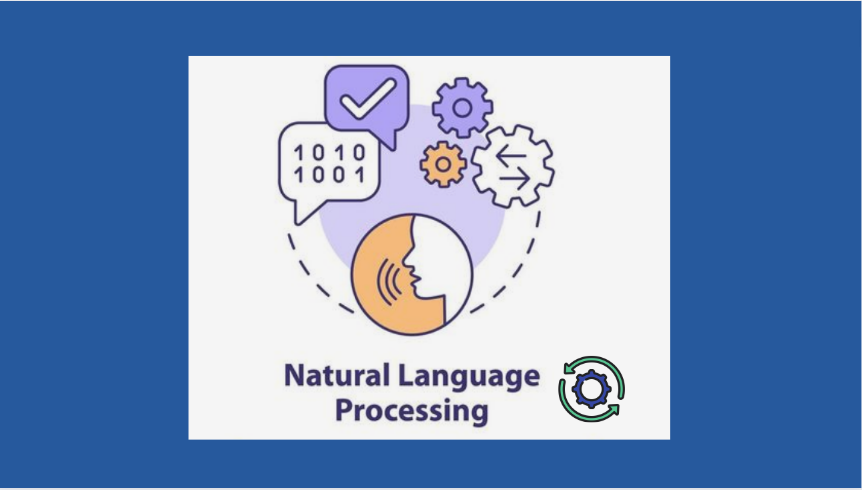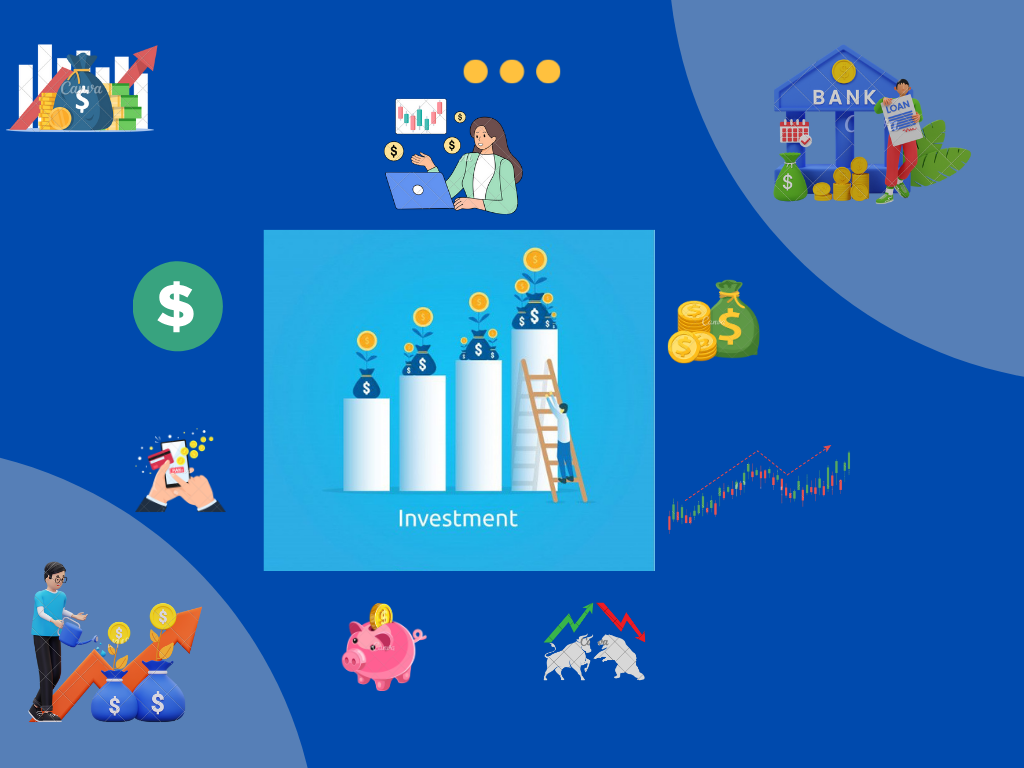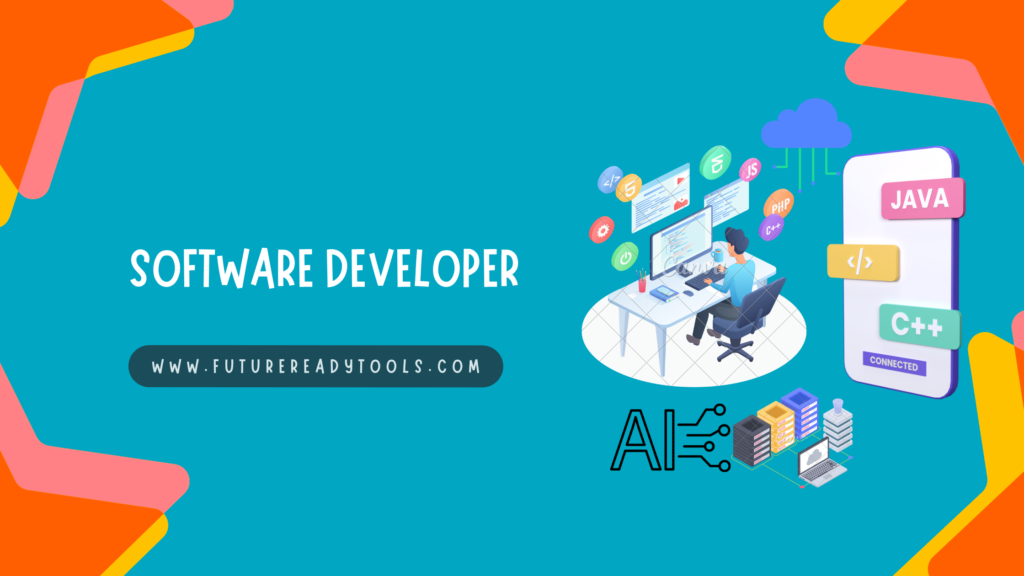- Introduction
- Define NLP
- Essential Skills for a Career in NLP Engineering
- Educational Journey
- Career Opportunities as an NLP Engineer:
- Challenges and Future Trends as an NLP Engineer:
- Organizations recruiting NLP Engineers:
- Online Courses for NLP Engineer Learning Success
- Certifications:
- Real-World Examples of Natural Language Processing
- Day in the life of an NLP Engineer
- Flexible Components
- External links:
- Frequently Asked Questions:
Introduction
As technology continues to evolve rapidly, the need for NLP Engineers who can effectively connect computers with human language is also growing. Natural Language Processing (NLP) Engineers are at the forefront of this convergence, as they are responsible for developing systems that can understand, interpret, and generate human-like text.
If you find the intersection of linguistics and technology interesting, then a career as an NLP Engineer may be the perfect fit for you. In the dynamic landscape of technology, the demand for professionals who can bridge the gap between computers and human language is rising.
Natural Language Processing (NLP) Engineers play a pivotal role in this convergence, creating systems that can understand, interpret, and generate human-like text. If you’re intrigued by the fusion of linguistics and technology, a career as an NLP Engineer might be your path.
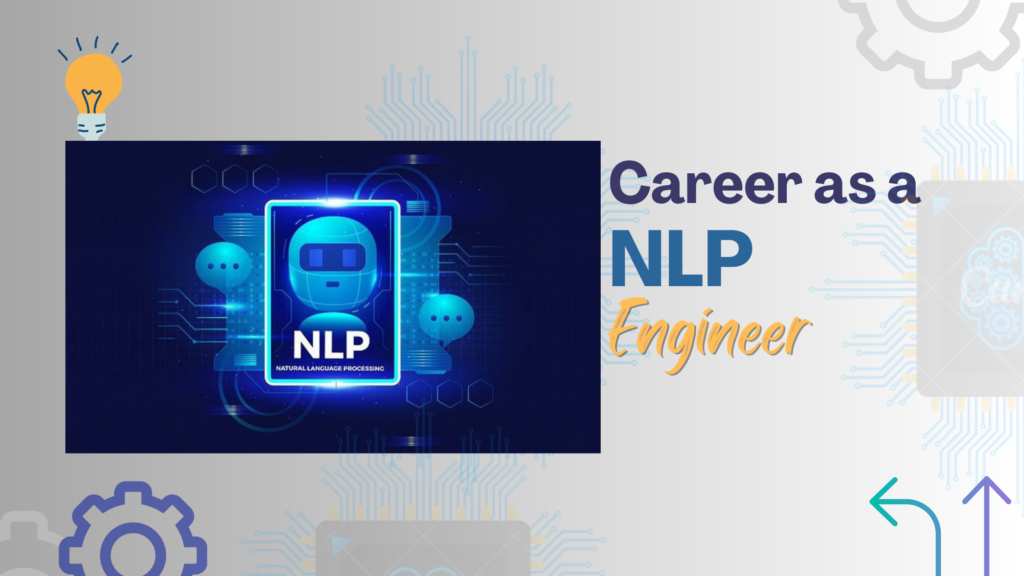
Define NLP
Natural Language Processing (NLP) is a fascinating subfield of AI that deals with the interaction between computers and human languages. As an NLP Engineer, one would work towards creating algorithms and models that enable machines to understand, interpret, and respond to human language in a way that is both meaningful and relevant to the context. It’s a challenging yet rewarding career choice for those interested in linguistics and technology.
Essential Skills for a Career in NLP Engineering
Aspiring NLP Engineers should possess a specific set of skills to excel in their field. The following skills are crucial for becoming a proficient NLP Engineer:
1. Programming Skills: It is essential to have a strong foundation in programming languages such as Python. Additionally, proficiency in libraries and frameworks like NLTK, spaCy, and TensorFlow is highly beneficial.
2. Machine Learning: A thorough understanding of machine learning algorithms and techniques is necessary for building NLP models. Knowledge of unsupervised learning as well as deep learning can significantly contribute to one’s expertise.
3. Linguistic Understanding: A solid grasp of linguistics, syntax, and semantics is crucial for accurately interpreting and generating language through NLP models.
4. Data Processing: Dealing with large volumes of data is a significant aspect of an NLP Engineer’s role. Hence, proficiency in data preprocessing and cleaning techniques is key to developing effective models.
5. Problem-Solving Abilities: NLP Engineers frequently encounter challenges. Therefore, the ability to critically analyze problems and devise solutions is highly valuable in this field.
Educational Journey
Obtaining an associate or bachelor’s degree in a field such as engineering, data science, or computer science can be a good starting point for aspiring NLP Engineers. However, for high-level positions, a master’s degree in a related subject like data science or artificial intelligence, or a Ph.D. with a focus on NLP, is often preferred or required. That said, some companies may consider professional experience as a substitute for an advanced degree, depending on the role and the specific requirements of the position.
Career Opportunities as an NLP Engineer:
As an NLP Engineer, you have a variety of career opportunities to choose from.
Tech Companies: You could work for tech companies, where you would develop chatbots, virtual assistants, and language-understanding applications.
Healthcare: Alternatively, you could work in healthcare, where you would contribute to the development of tools for medical text analysis and documentation.
Finance: If you’re interested in finance, you could build models for sentiment analysis in financial markets or enhance customer support systems.
E-commerce: E-commerce is another industry where you could apply your skills, optimizing product recommendations and improving search functionality using NLP. To learn more about other careers check out this website https://futurereadytools.com/category/careers/
Finally, you could also contribute to academic research or join research and development teams in tech companies. The possibilities are endless!
Challenges and Future Trends as an NLP Engineer:
The field of natural language processing (NLP) is constantly changing. It’s important to stay up-to-date with the advancements. There are challenges in NLP, such as dealing with language ambiguity understanding context, and addressing model biases. In the future, we can expect to see NLP being integrated with AI technologies like computer vision as well as the development of more advanced conversational agents.
When it comes to NLP education in both India and abroad some colleges and universities offer programs. However, please keep in mind that this information is subject to change. It’s advisable to visit the institution’s websites for the most up-to-date program details.
| Institution | Location | Programs Offered | Website |
| INDIA | |||
Indian Institute of Technology (IIT), Bombay | Mumbai | M.Tech in Computer Science and Engineering | https://www.cse.iitb.ac.in/ |
| International Institute of Information Technology | Hyderabad | M.Tech in Computer Science and Information Security, M.Tech in Computational Linguistics | https://www.iiit.ac.in/ |
| Jawaharlal Nehru University (JNU) | New Delhi | M.Tech in Computational and Systems Biology | https://www.jnu.ac.in/main/ |
| ABROAD | |||
| Massachusetts Institute of Technology (MIT) | USA | Master of Science in Electrical Engineering and Computer Science (NLP courses available) | https://www.eecs.mit.edu/ |
| Stanford University | USA | Master of Science in Computer Science (NLP Group) | https://www.cs.stanford.edu/ |
| University of Cambridge | UK | MPhil in Machine Learning, Speech, and Language Processing | https://www.mlmi.eng.cam.ac.uk/ |
| University of Edinburgh | UK | MSc in Speech and Language Processing | https://www.ed.ac.uk/informatics |
| ETH Zurich | Switzerland | Master in Data Science (focus on NLP) | https://ethz.ch/en/studies/master/degree-programmes/engineering-sciences/data-science.html |
Remember, when considering a program, it’s essential to review the curriculum, faculty expertise, and any specific NLP-related research activities at the institution. Additionally, check for admission requirements, application deadlines, and other relevant details.
Organizations recruiting NLP Engineers:
Below is a basic table outlining some organizations that recruit Natural Language Processing (NLP) engineers. Keep in mind that the demand for NLP engineers spans various industries, and this list is not exhaustive. It’s always a good idea to explore opportunities in specific sectors or companies that align with your interests and career goals.
| Organization | Industry | Location | Website |
| Technology | Global | https://www.google.com/about/careers/applications/ | |
| Microsoft | Technology | Global | https://careers.microsoft.com/v2/global/en/home.html |
| Amazon | E-commerce and Technology | Global | https://www.amazon.jobs/en/ |
Facebook (Meta) | Social Media and Technology | Global | https://www.metacareers.com/?utm_source=meta.com&utm_medium=redirect |
| IBM | Technology and Consulting | Global | https://www.ibm.com/careers/us-en/ |
| Apple | Technology | Global | https://www.apple.com/careers/us/ |
| NVIDIA | Technology | Global | https://www.nvidia.com/en-us/about-nvidia/careers/ |
| Salesforce | Cloud computing and CRM | Global | https://careers.salesforce.com/en/ |
| Adobe | Software and Creative Industries | Global | https://www.adobe.com/careers.html |
| OpenAI | Artificial Intelligence Research | Global | https://openai.com/careers |
| Booking.com | Online Travel Agency | Global | https://careers.booking.com/ |
| SAP | Enterprise Software and Technology | Global | https://jobs.sap.com/?locale=en_US |
| Nuance Communications | Healthcare and AI | Global | https://www.nuance.com/index.html |
This list provides a starting point, and it’s recommended to explore job opportunities on the official websites of these organizations. Additionally, consider looking into startup companies, research institutions, and other sectors where NLP is increasingly becoming a valuable asset.
Online Courses for NLP Engineer Learning Success
Remember, these are just a few examples, and there are many more online courses and certifications available in NLP and machine learning. Make sure to do your research and choose a course that aligns with your interests and career. Please take note of the following courses related to Natural Language Processing:
1. Natural Language Processing in Python (DataCamp)
Platform: https://www.datacamp.com/courses/introduction-to-natural-language-processing-in-python
Description: In this course, you will learn the fundamentals of NLP using Python. The topics covered include tokenization, part-of-speech tagging, named entity recognition, and more.
2. Natural Language Processing Specialization (Coursera)
Platform: https://www.coursera.org/courses?query=nlp
Institution: National Research University Higher School of Economics (HSE)
Description: This comprehensive specialization covers basic to advanced NLP concepts, including text mining and text manipulation.
3. Natural Language Processing (Udacity)
Platform: https://www.udacity.com/course/natural-language-processing-nanodegree–nd892
Description: This intermediate-level course focuses on building practical NLP applications, including sentiment analysis and language translation.
4. Applied Natural Language Processing with Python (LinkedIn Learning)
Platform: https://www.linkedin.com/learning/topics/natural-language-processing-nlp
Description: This practical course covers NLP applications using Python, with a focus on real-world projects.
Machine Learning Courses
- Machine Learning (Coursera)
- Instructor: Andrew Ng
- Platform: Coursera
- Description: A foundational course in machine learning, covering topics like linear regression, neural networks, and clustering.
- Machine Learning (Stanford University) – CS229
- Instructor: Andrew Ng
- Platform: Stanford Online
- Description: The online version of Stanford University’s renowned CS229 course, covers a wide range of machine-learning topics.
- Practical Machine Learning for Computer Vision (Udacity)
- Platform: Udacity
- Description: Focuses on applying machine learning techniques to computer vision problems, including image classification and object detection.
- Machine Learning A-Z™: Hands-On Python & R In Data Science
- Platform: Udemy
- Description: A comprehensive course covering machine learning concepts and applications using both Python and R.
Certifications:
- Microsoft Azure: Natural Language processing
- Issued by: Microsoft
- Certification Details
- TensorFlow Developer Certificate
- Issued by: TensorFlow
- Certification Details
- Deep Learning Specialization (Coursera)
- Issued by: deeplearning.ai
- Certification Details
- AWS Certified Machine Learning – Specialty
- Issued by: Amazon Web Services (AWS)
- Certification Details
Make sure that the content of the course matches your skill level and learning goals. It’s also an idea to check for any prerequisites and read reviews to ensure that the course aligns with your expectations.
Real-World Examples of Natural Language Processing
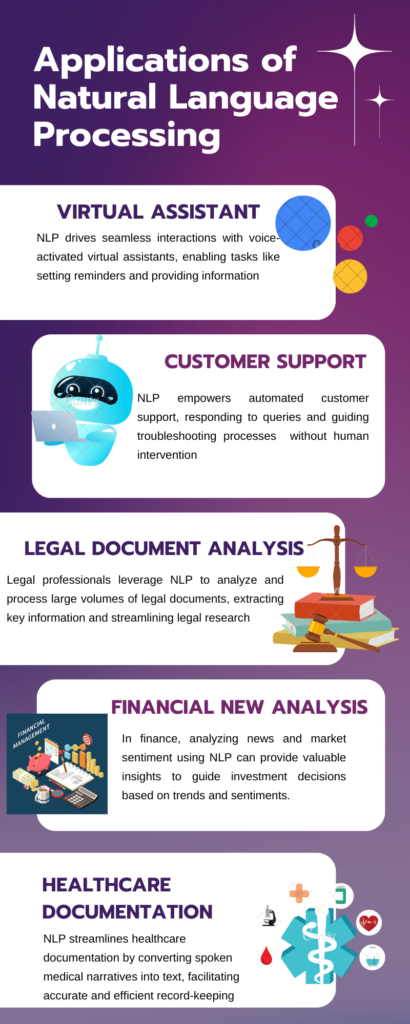
Natural Language Processing (NLP) is widely used in various real-life scenarios to enable machines to understand, interpret, and generate human language. Here are some examples of how NLP is applied in different fields:
Chatbots and Virtual Assistants:
Scenario: Natural Language Processing (NLP) is extensively used in developing chatbots and virtual assistants.
Application: Virtual assistants like Siri, Alexa, and Google Assistant use NLP to understand spoken or typed queries, provide relevant information, set reminders, and perform various tasks through natural language interactions.
Customer Support and Service Desks:
Scenario: Many companies employ NLP in their customer support systems.
Application: NLP enables automated systems to understand and respond to customer inquiries, providing relevant information or guiding users through troubleshooting processes without human intervention.
Sentiment Analysis in Social Media:
Scenario: Companies use NLP to analyze sentiment in social media and online reviews.
Application: NLP allows companies to gauge public sentiment towards their products or services by analyzing social media posts and reviews.
Language Translation Services:
Scenario: Natural Language Processing (NLP) is a vital component in language translation applications and services, as demonstrated by platforms such as Google Translate and Microsoft Translator
Application: NLP algorithms are leveraged to translate text or speech from one language to another, taking into account linguistic nuances for more accurate translations.
Healthcare Documentation:
Scenario: Within the healthcare sector, NLP plays a crucial role in medical transcription and documentation.
Application: NLP systems convert spoken medical narratives into text, facilitating the creation of patient records, medical reports, and other documentation, thereby saving time and reducing errors.
Email Filtering and Categorization:
Scenario: Email systems also utilize NLP algorithms to filter and categorize messages based on language patterns and content
Applications: Email clients can identify spam, categorize messages into folders, and prioritize important communications based on language patterns and content.
Legal Document Analysis:
Scenario: In the legal industry, legal professionals use NLP to analyze and process large volumes of legal documents.
Applications: NLP assists in extracting pertinent information, identifying key legal concepts, and summarizing lengthy documents, streamlining legal research and analysis.
Financial New Analysis:
Scenario: Natural Language Processing (NLP) is applied in the finance industry to analyze news articles and market sentiment.
Application: Financial analysts use NLP to process and analyze news sources, social media, and financial reports to gain insights into market trends and sentiments that can affect investment decisions.
E-learning Education:
Scenario: NLP is used in educational platforms for various purposes.
Application: NLP helps in developing automated grading systems, providing feedback on written assignments, and personalizing learning experiences by understanding and adapting to individual student needs.
Smart Content Recommendation:
Scenario: NLP powers content recommendation systems on platforms such as Netflix, Spotify, and Amazon.
Applications: These systems analyze user preferences, search history, and viewing/listening habits to recommend personalized content, enhancing user experience and engagement.
These applications highlight the growing importance of NLP in various industries and sectors. Businesses and organizations must recognize the potential benefits of NLP and invest in developing NLP-based solutions.
The use of NLP in these applications can lead to increased efficiency, accuracy, and cost savings, ultimately resulting in a more streamlined and effective workflow.
Thus, businesses and organizations are strongly encouraged to explore the potential of NLP and its applications to remain competitive and at the forefront of innovation in their respective fields.
Day in the life of an NLP Engineer
A Day in the Life of a Natural Language Processing (NLP) engineer can vary based on the specific industry, company, and project they are working on. However, here is a generalized overview of what their typical day might look like:
Morning:
1. Review and Planning:
Check your emails and communication channels to stay updated on any messages or notifications. Assess the tasks and objectives for the day and plan out the day’s work considering project deadlines. Prioritize your tasks accordingly.
2. Data Exploration and Preprocessing:
Engage with datasets, explore and preprocess data. Cleanse and format the data to ensure it is ready for model training.
3. Model Training and Evaluation:
Employ machine learning techniques to train and refine NLP models. Evaluate model performance, and do parameter adjustments to enhance accuracy and efficiency.
Afternoon:
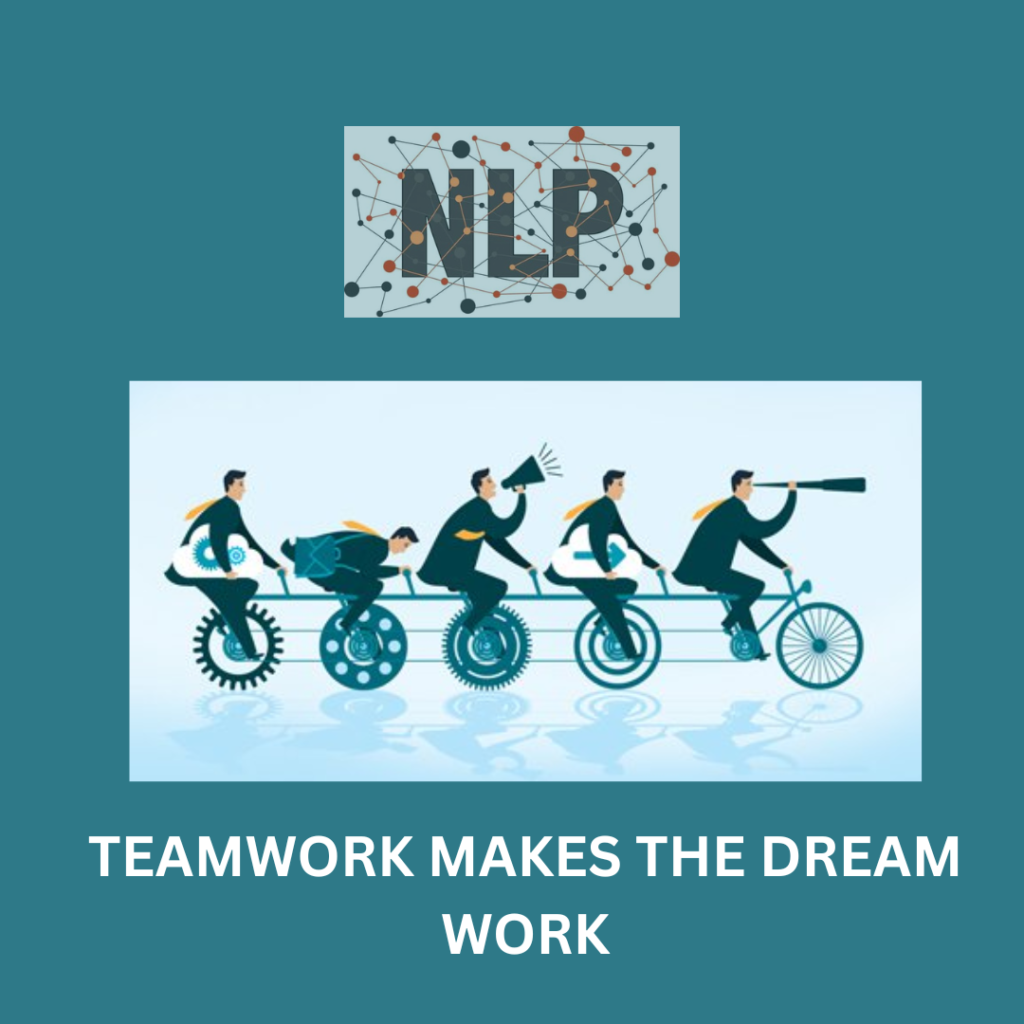
1. Code Development:
Write code for NLP algorithms and models. Collaborate with software engineers to integrate NLP components into systems or applications.
2. Problem Solving and Optimization:
Tackle challenges or issues that arise during the development process. Optimize models to enhance performance.
3. Team Collaboration:
Collaborate with teams, including data scientists, software engineers, and domain experts. During meetings, actively participate in discussions regarding the progress of the project. Address any challenges that arise and brainstorm solutions.
In the evenings:
- Documentation:
Document aspects such as code, algorithms, and processes for reference. Regularly update project documentation to ensure that it remains clear and transparent.
2. Continuously strive for learning and improvement:
Keep up to date with advancements in natural language processing (NLP), machine learning, and related fields. Engage in self-learning by exploring research papers, tutorials, or online courses to expand your knowledge and skills.
3. Networking and effective communication are crucial:
- Connect with colleagues regularly and attend team or department meetings to stay connected with updates on project progress.
- Communicate effectively with stakeholders to gather feedback or clarify any requirements.
Flexible Components
- Research and Innovation:
- Allocate time for exploring new research in NLP and proposing innovative solutions.
- Experiment with novel approaches to address specific challenges.
- Project Management:
- Manage project timelines, ensuring that tasks are completed within deadlines.
- Collaborate with project managers to provide updates on progress and discuss any potential roadblocks.
External links:
NLP Libraries and Frameworks:
- Online Courses and Certifications:
- Industry Use Cases:
Frequently Asked Questions:
Q. What does an NLP engineer do?
A. NLP engineers design and develop algorithms and models that enable computers to understand, interpret, and generate human language.
Q. How to become an NLP engineer?
A. Typically, a bachelor’s or higher degree in computer science, AI, or a related field is required. Gain proficiency in programming languages like Python, learn NLP libraries and frameworks and engage in practical projects.
Q What skills are required for a career in NLP engineering?
A. Skills include programming (Python), machine learning, linguistic knowledge, data processing, problem-solving, and familiarity with NLP libraries like NLTK, spaCy, or TensorFlow.
Q. Which programming languages are essential for NLP engineers?
A. Python is widely used in the NLP field due to its extensive libraries and community support.
Q. Are there specific certifications for NLP engineers?
A. Yes, certifications like the TensorFlow Developer Certificate and various online courses on platforms like Coursera and Udacity can be beneficial.
Q. What industries hire NLP engineers?
A. NLP engineers are sought after in tech companies, healthcare, finance, e-commerce, research, and more.
Q. Can you provide examples of NLP applications in real life?
A. Examples include chatbots, virtual assistants (like Siri or Alexa), sentiment analysis, language translation, and spam filtering.
Q. What are the challenges in natural language processing?
Q. Challenges include ambiguity in language, understanding context, handling different languages, and addressing biases in models.
Q. How does machine learning relate to NLP?
A. NLP often uses machine learning techniques to train models on large datasets for tasks like text classification, named entity recognition, and language generation.
Q. What are the common tools and libraries used by NLP engineers?
A. NLTK, spaCy, TensorFlow, and PyTorch are popular tools and libraries in the NLP field.
Q. Is a graduate degree necessary for a career in NLP engineering?
A. While not always mandatory, having a graduate degree (Master’s or Ph.D.) can enhance career prospects in research and advanced roles.
Q. What are the current trends in NLP research?
A. Current trends include transformer-based models (like BERT), pre-trained language models, and the integration of NLP with other AI technologies.
Q. How does NLP contribute to chatbot development?
A. NLP enables chatbots to understand and respond to user queries in natural language, making interactions more intuitive and effective.
Q. Are there online courses for learning NLP?
A. Yes, platforms like Coursera, Udacity, and LinkedIn Learning offer online courses and specializations in NLP.
Q. Can you explain the difference between NLP and machine learning?
A. NLP is a subset of machine learning that focuses specifically on language-related tasks, while machine learning encompasses a broader range of algorithms for learning patterns from data.

